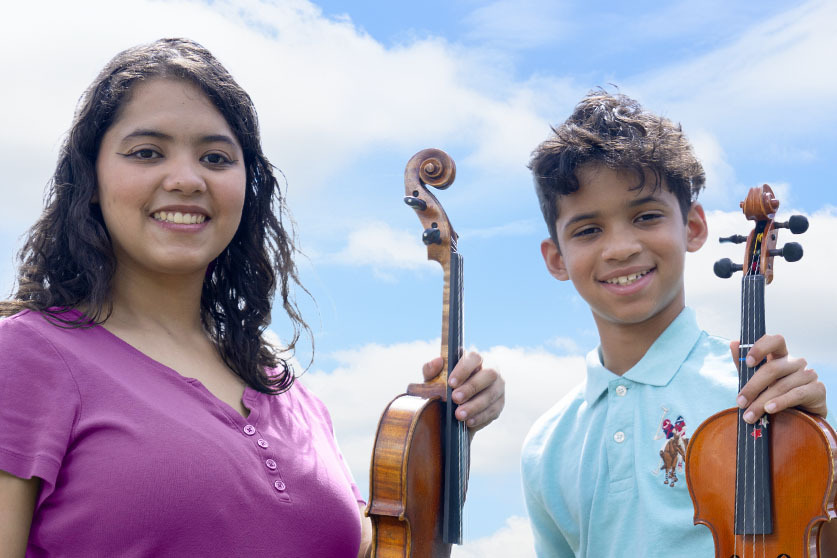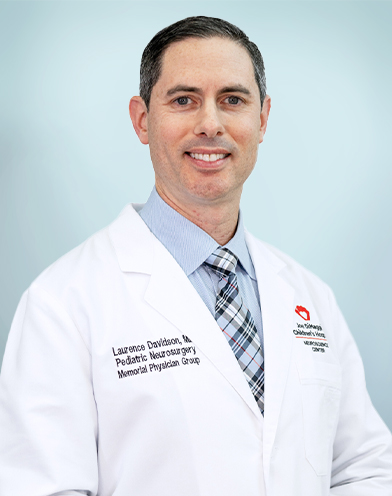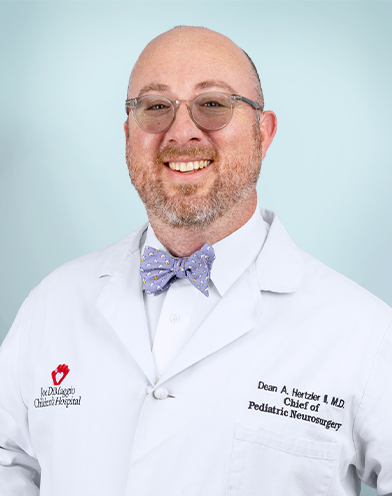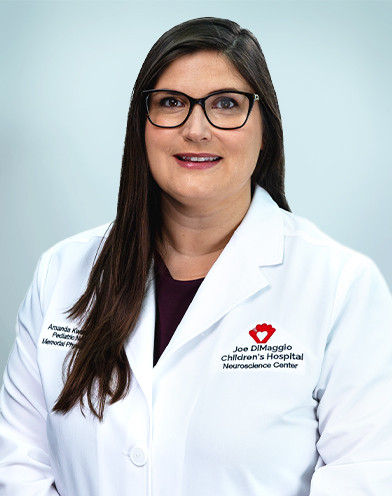
Pediatric Neurosurgery
Our neurosurgeons perform intricate procedures for complex pediatric brain and spine conditions.
Nobody wants to need a pediatric neurosurgeon. But if you do, you need a fellowship-trained pediatric physician with experience in complex neurological conditions and the unique ways to treat them in children.
We specialize in surgical treatments for unborn babies, infants, children and adolescents with conditions affecting their brain and spine. Our pediatric neurosurgery team uses leading-edge technology for the safest, most accurate approach to every procedure. We care for your whole family to help you through this stressful and frightening time.
To make an appointment or learn about our neurosurgery services, call:
954-265-3500Types of Pediatric Neurosurgery by Condition
If your child has a neurological condition involving a specific area of their brain, pediatric brain surgery may be a cure. It may also slow the disease process, help reduce symptoms or improve daily function. We have specific protocols for each neurosurgical procedure.
Our neurosurgeons can correct or minimize mild to severe deformities that affect a child’s skull. Examples include plagiocephaly, skull flattening and craniosynostosis.
In some children with epilepsy, a specific area of the brain causes seizures. Surgical interventions can cure the condition or reduce the number or intensity of seizures. We may recommend cutting away the brain tissue that’s causing seizures or using a laser to destroy it.
Another procedure for epilepsy is vagus nerve stimulation. We implant a device under the skin in the left chest and connect it to the vagus nerve in the neck. The device sends mild electrical impulses through the nerve. The impulses can reduce the abnormal electrical signals responsible for seizures.
This condition is caused by abnormal fluid buildup deep within the brain in cavities called ventricles. This fluid buildup puts harmful pressure on brain tissue. Surgical intervention can help control symptoms, reduce pressure and protect the brain.
• One method is to place a drainage system under your child’s scalp. A tube called a shunt or catheter takes the fluid away from the brain and into the belly, where it can be naturally absorbed. For example a ventriculoperitoneal shunt (VP shunt). A drainage system called an endoscopic third ventriculostomy (ETV) may have to stay in place for life and may require future surgeries.
Another surgical option for hydrocephalus involves creating a small hole at the base of the brain. This option gives excess fluid a way to escape the brain.
Neurocutaneous disorders are rare, genetic disorders that are present at birth. They can cause tumors to grow on the brain, spinal cord, organs, skin and bones. We have a multispecialty clinic for children with neurocutaneous disorders such as tuberous sclerosis and neurofibromatosis. In addition to neurosurgeons, the team may include neurologists, hematologists/oncologists, cardiologists and nephrologists as needed.
We offer medical and surgical treatments for spasticity that’s present at birth (congenital) and occurs later in life (acquired) through our Spasticity Clinic. They include:
- Baclofen pump: Baclofen is a muscle relaxant to treat spasticity. A surgeon places a small pump under the skin of the abdomen. A thin tube connects the pump to the spine, where the medicine is delivered. A pump can make medication more effective at a lower dose and reduce sleepiness as a side effect. The pump must be refilled every few months and replaced every five to seven years.
- Selective dorsal rhizotomy: This minimally invasive procedure cuts away some sensory nerve fibers in the spine. It can permanently reduce leg spasticity, often improving independent walking.
The neural tube is a structure that forms the early brain and spine in a baby as it grows in the womb. An open neural tube defect also known as Myelomeningocele is a problem with how the brain, spinal cord or spine forms before birth. Spina bifida is the most common type of neural tube defect.
If your obstetrician or neonatal neurologist identifies this type of defect in your unborn baby, surgery before birth may help. We can repair some of these defects or reduce fluid on your baby’s brain (hydrocephalus) by going through the uterus. This surgery can improve outcomes after your baby is born. Our specialists can also repair neural tube defects and treat hydrocephalus after birth. We follow children throughout their lives at our Spina Bifida Clinic.
We follow our brain and spinal cord tumor patients in neuro - oncology clinic with oncologists, neurologists, radiation oncologists, endocrinologists and Physical Medicine and Rehabilitation (PM&R) physicians. We manage tumors with advanced technology including intraoperative MRI scanner or IMRI, gamma knife radiation and proton beam radiation.
Surgery for a brain or spine tumor is often curative. It usually involves a craniotomy, which temporarily removes part of the skull to expose the brain for the procedure. Once we have access to the brain, we can cut out part or all of the tumor. We may also use laser ablation to target and destroy tumor tissue. Then the section of skull is put back into place. This less invasive option is available for some types of tumors.
Brain and Spine Trauma:
We see patients after brain and spine trauma for acute surgery and long term management with surgical options.
Conditions we treat include:
- Herniated disc
- Neck pain
- Spinal stenosis
- Traumatic brain injuries
A Chiari malformation occurs when part of your child’s brain tissue (cerebral tousles) extends into their spinal canal. It’s caused when the lower back part of the skull is too small causing the tousles to compress the brain stem and spinal cord. Surgery can be curative or dramatically reduce symptoms, including headaches, balance problems, choking and gagging.
- Arachnoid Cysts
- Craniosynostosis
- Dermoid Cysts
- Encephaloceles
- Foramen Magnum Stenosis
- Moyamoya
- Myelomeningoceles
- Pituitary Tumors
- Sacral Dimples
- Skull Defects
- Skull Fractures
- Tethered Cord Syndrome
We often collaborate with a variety of subspecialists including:
- Pediatric Neurologists
- Pediatric Critical Care (both pediatric and neonatal)
- Pediatric Orthopedic Surgeons
- Pediatric Physiatrists
- Pediatric Plastic Surgeons
- Pediatric Hematologists/Oncologists
- Pediatric ENT (Otolaryngologists)
- Pediatric Endocrinologists
- Pediatric Geneticists
- Pediatric Interventional Neuroradiologists
- Pediatric Neuropsychologists
- Pediatric Urologists
Multidisciplinary Clinics
We collaborate with these specialists in a variety of multidisciplinary clinics including:
An accredited clinic that allows patients with multiple craniofacial syndromes and anomalies to receive coordinated care from a specialized team. Subspecialties, in addition to neurosurgery, include:
- Genetics
- Plastic craniofacial surgery
- Ear, nose and throat (otolaryngology)
- Oral maxillofacial surgery
- Audiology
- Psychology
- Speech therapy
- Social work
Learn more about the Craniofacial Clinic.
A multidisciplinary clinic treating children with tuberous sclerosis, neurofibromatosus and other Neurocutaneous disorders. The clinic is led by neurology and neurosurgery and includes specialists from:
- Hematology/oncology
- Cardiology
- Renal (as needed)
Our multidisciplinary pediatric neuro-oncology clinic provides brain tumor patients with access to multiple specialties in one visit. Specialties include:
- Neurosurgeons
- Oncologists
- Neurologists
- Radiation oncologists
- Endocrinologists
- Physiatrists
Combined clinic where patients with congenital and acquired spasticity can be assessed by both neurosurgeons and physiatrists to make informed treatment plans that include medical and surgical management.
Providing patients with spina bifida with advanced, coordinated care from a team of specialists.We follow children throughout their lives at our Spina Bifida Clinic
To make an appointment or learn about our neurosurgery services, call:
954-265-3500
Leyra and Zavyer’s Hydrocephalus Story
Siblings Leyra and Zavyer were both born with hydrocephalus, a serious condition treated with a ventriculoperitoneal shunt at Joe DiMaggio Children’s Hospital.
Pediatric Neurosurgery: Why Choose Joe DiMaggio Children's Hospital?
When you bring your child to Joe DiMaggio Children’s Hospital for neurosurgery, you’ll find:
- Experienced specialists: We have a team of board certified, fellowship trained pediatric neurosurgeons. They have extensive training and experience performing these complex procedures, specifically in children.
- Multidisciplinary approach: Our neurosurgeons are part of a multidisciplinary team of specialists who meet regularly to discuss your child’s treatment. This team approach leads to more convenient, coordinated, comprehensive care. Your care team includes your neurosurgeon and a neurologist who specializes in your child’s condition. The team also includes anesthesiologists, who control pain, and palliative care specialists, who help manage symptoms. Physical, occupational and speech therapists help your child regain function after surgery.
- Advanced technology: For conditions related to the brain, we use state-of-the-art imaging technology called intraoperative MRI to accurately target the precise area of the brain involved and protect healthy tissue. We use neuromonitoring to check your child’s neurological status continuously to ensure that functional areas of the brain are still working well.
- Family-centered care: Having a child undergo neurosurgery can be a stressful and overwhelming experience for the entire family. We take time to listen to your concerns, answer your questions and offer support in any way we can.
- Welcoming environment: Our child life specialists create a welcoming environment for children and families so that the hospital experience is less scary. We have amenities and family areas to make your time here as comfortable and soothing as possible. You’re welcome to stay with your child as much as you’d like. We also offer an on-campus Conine Clubhouse as a special home away from home while your child is in the hospital.







It matters to you. It matters to us.
Joe DiMaggio Children's Hospital Quality and Safety
See our hospital's patient satisfaction numbers, number of patients and more.
View Quality and SafetyYou have a Right to Know About Prices
We want to give you the information you need to make important healthcare decisions, including the costs of our services.
View PricingMyChart Portal
View test results, schedule follow-up appointments, request prescription refills and more.
Login or Sign-up to MyChart












